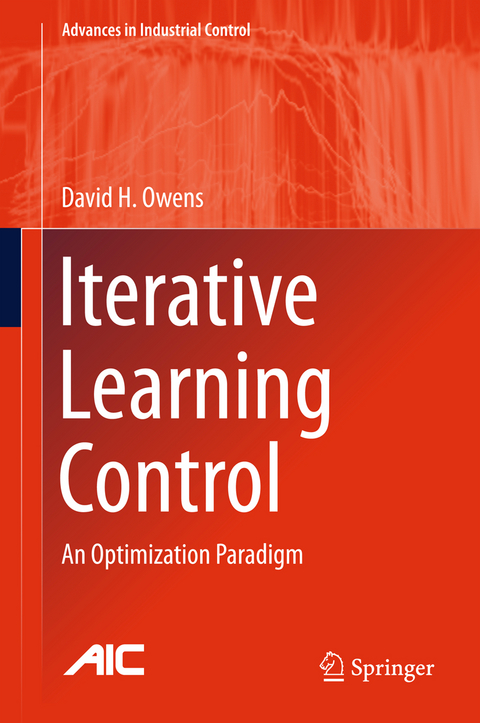
Iterative Learning Control
Springer London Ltd (Verlag)
978-1-4471-6770-9 (ISBN)
Using detailed examples taken from linear, discrete and continuous-time systems, the author gives the reader access to theories based on either signal or parameter optimization. Although the two approaches are shown to be related in a formal mathematical sense, the text presents them separately as their relevant algorithm design issues are distinct and give rise to different performance capabilities.
Together with algorithm design, the text demonstrates the underlying robustness of the paradigm and also includes new control laws that are capable of incorporating input and output constraints, enable the algorithm to reconfigure systematically in order to meet the requirements of different reference and auxiliary signals and also to support new properties such as spectral annihilation.
Iterative Learning Control will interest academics and graduate students working in control who will find it a useful reference to the current status of a powerful and increasingly popular method of control. The depth of background theory and links to practical systems will be of use to engineers responsible for precision repetitive processes.
Professor Owens has 40 years of experience of Control Engineering theory and applications in areas including nuclear power, robotics and mechanical test. He has extensive teaching experience at both undergraduate and postgraduate levels in three UK universities. His research has included multivariable frequency domain theory and design, the theory of multivariable root loci, contributions to robust control theory, theoretical methods for controller design based on plant step data and involvement in aspects of adaptive control, model reduction and optimization-based design. His area of research that specifically underpins the text is his experience of modelling and analysis of systems with repetitive dynamics. Originally arising in control of underground coal cutters, my theory of “multipass processes” (developed in 1976 with follow-on applications introduced by J.B. Edwards) laid the foundation for analysis and design in this area and others including metal rolling and automatedagriculture. This work led to substantial contributions (with collaborator E. Rogers and others) in the area of repetitive control systems (as part of 2D systems theory) but more specifically, since 1996, in the area of iterative learning control when I introduced the use of optimization to the ILC community in the form of “norm optimal iterative learning control”. Since that time he has continued to teach and research in areas related to this topic adding considerable detail and depth to the approach and introducing the ideas of parameter optimal iterative learning to simplify the implementations. This led to his development of a wide range of new algorithms, supporting analysis and applications to mechanical test. This work is also being applied to the development of data analysis tools for control in gantry robots and stroke rehabilitation equipment by collaborators at Southampton University. Work with S. Daley has also seen applications in automative test at Jaguar and related industrial sites. David Owens was elected a Fellow of the Royal Academy of Engineering for his contributions to knowledge in these and other areas.
Iterative Learning Control: Background and Review. Mathematical and Linear Modelling Methodologies.- Norm Optimal Iterative Learning Control: An Optimal Control Perspective.- Predicting the Effects of Non-minimum-phase Zeros.- Predictive Norm Optimal Iterative Learning Control.- Other Applications of Norm Optimal Iterative Learning Control.- Successive Projection Algorithms.- Parameter Optimal Iterative Learning Control.- Robustness of Parameter Optimal Iterative Learning Control.- Multi-parameter Optimal Iterative Learning Control.- No Normal 0 false false false EN-GB X-NONE X-NONE/* Style Definitions */ table.MsoNormalTable {mso-style-name:"Table Normal"; mso-tstyle-rowband-size:0; mso-tstyle-colband-size:0; mso-style-noshow:yes; mso-style-priority:99; mso-style-parent:""; mso-padding-alt:0cm 5.4pt 0cm 5.4pt; mso-para-margin-top:0cm; mso-para-margin-right:0cm; mso-para-margin-bottom:10.0pt; mso-para-margin-left:0cm; line-height:115%; mso-pagination:widow-orphan; font-size:11.0pt; font-family:"Calibri","sans-serif"; mso-ascii-font-family:Calibri; mso-ascii-theme-font:minor-latin; mso-hansi-font-family:Calibri; mso-hansi-theme-font:minor-latin; mso-fareast-language:EN-US;} nlinear Iterative Learning Control and Optimization.
| Erscheinungsdatum | 13.12.2015 |
|---|---|
| Reihe/Serie | Advances in Industrial Control |
| Zusatzinfo | XXVIII, 456 p. |
| Verlagsort | England |
| Sprache | englisch |
| Maße | 155 x 235 mm |
| Themenwelt | Informatik ► Theorie / Studium ► Algorithmen |
| Informatik ► Theorie / Studium ► Künstliche Intelligenz / Robotik | |
| Technik ► Elektrotechnik / Energietechnik | |
| Technik ► Maschinenbau | |
| ISBN-10 | 1-4471-6770-8 / 1447167708 |
| ISBN-13 | 978-1-4471-6770-9 / 9781447167709 |
| Zustand | Neuware |
| Haben Sie eine Frage zum Produkt? |
aus dem Bereich


